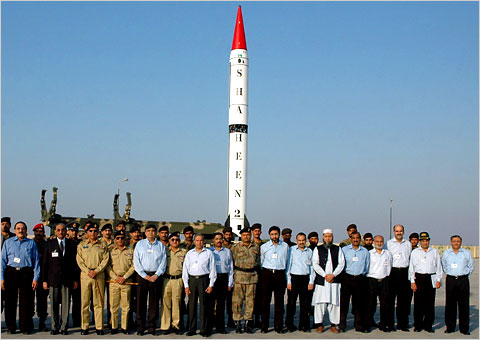Pakistan’s Nuclear Scenarios, U.S. Solutions
The New York Times |
By Parag Khanna
Gen. David Petraeus, head of the United States Central Command, has stated that the next two weeks are crucial to Pakistan’s survival, while counter-insurgency expert David Kilcullen has said that the country could collapse within six months.
General Kiyani, Pakistan’s Army chief, could declare martial law imminently if his counter-offensives in the Swat region prove ineffective in stemming Taliban infiltration into the Punjab. But that action will mean little unless the Pakistani government can regain control of the restive Pashtun-dominated provinces, or risk losing its nominal authority over those areas forever. On the political level, the National Assembly must pass a constitutional amendment to integrate the Federally Administered Tribal Areas into the Northwest Frontier Province and mandate a fresh round of provincial elections.
This would give the government some way to replace gradually the Frontier Crimes Regulation, the British-era laws that were imposed to control the Pashtun tribal areas and which have abetted the Taliban’s rise in those regions. President Zardari must also allow the sign the Political Parties Act to allow the formation of political groups in those areas. These steps would allow the government to assert sovereignty and justify a strengthened presence of the Frontier Corps and police to monitor elections, while forcing the Taliban to consider secular options.
A smarter balance between military and police efforts is also needed. Pakistan needs to launch its own indigenous version of the NATO-led Provincial Reconstruction Teams, which have had some success in maintaining local order, building relationships with district-level authorities, and stimulating small-scale economic activity. Yet while the focus to date has been almost exclusively on military-driven counterinsurgency, this requires boosting police recruitment and training while corralling civilian forces to oversee the construction of roads, schools, hospitals, and government offices. For its part, the military must now focus on internal defense, disrupting militant networks which have gained strength even in the Punjabi heartland.
If the recent protests against Talibanization rippling across continent are any indication, the secular elites are becoming quite vocal. This sliver of the population together with Pakistan’s wealthy diaspora could play an influential role in restoring unity among Pakistan’s many factions.
